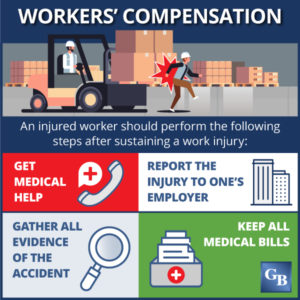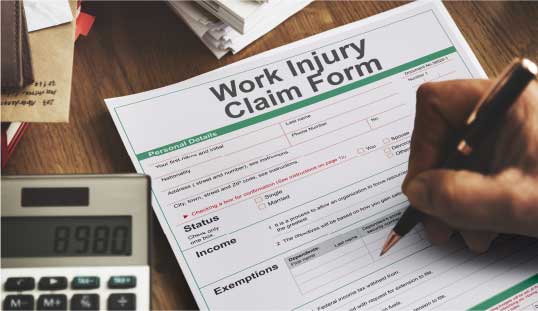Serving Philadelphia, Bethlehem, Lancaster and Reading, and clients throughout New Jersey and Pennsylvania.
Lives change when injuries occur. Our Philadelphia Workers’ Compensation lawyers at Galfand Berger LLP are dedicated to helping people whose world is changed by a workplace accident, injury, or exposure. We help injured workers throughout Pennsylvania and New Jersey navigate the complexities of the Workers’ Compensation and Social Security Disability process.
Often, injured workers have questions about their rights. That is why it is important to have experienced attorneys. We are not afraid to take on employers and insurance companies who try to deny benefits. Galfand Berger LLP has written a book on handling Workers’ Compensation cases in Pennsylvania. You can download a copy of Workers’ Rights to Workers’ Compensation here.
What Is a Workplace Injury?
The Pennsylvania Workers’ Compensation Act defines an injury as “an injury to an employee, regardless of his previous physical condition, arising in the course of his employment and related thereto.” It includes aggravation, reactivation or acceleration, or death resulting from injury.
Workers’ Compensation provides injured workers with resources to maintain an adequate standard of living. It includes wage loss benefits and medical benefits. However, Workers’ Compensation only pays a portion of your loss; it does not pay for the total lost wages, pain and suffering, and more. You should know your rights and ensure your employer meets their obligation under the law.
Will Workers’ Compensation Cover a Disease or Illness?
Many workers are exposed to chemicals, solvents, fumes, dirt, dust, and other hazards. These agents can cause various diseases and illnesses and, in some cases, even can result in death. If your disease or illness was caused, in whole or in part, by your job, you are entitled to Workers’ Compensation benefits.
If you suspect that your injury, illness, or disease is caused by your job, discuss this with your doctor and a lawyer.
What Should I Do After a Work Accident?

If you are injured at work, there are several steps you can take to protect your rights as well as your health, including:
- Seek medical help. Getting medical attention immediately after the accident is crucial. If your injuries are severe, call 911 or ask someone nearby to do so. Otherwise, your employer should allow you to leave work so you can seek medical care. Your company may have a list of approved doctors you must see for treatment.
- Report the injury. It is important to report the injury to your employer as soon as possible after the accident. You must tell your supervisor about the incident to document the date and circumstances for future claims and legal proceedings.
- Keep all records. Maintain all medical records, related reports, and bills accumulated because of your injury, including those for doctor visits, medical tests, and procedures. This will help preserve a record of treatment and expenses incurred if there is a problem later.
- Gather evidence. Do your best to take pictures of the accident site and your injuries, and obtain a copy of your timecard and any other evidence that proves that you were working at the time of the accident. An experienced attorney can assist you with this step of the process.
What Is the Injured Workers’ Bill of Rights?
There are a lot of rules and regulations regarding the care and treatment you can receive from a doctor. The Workers’ Compensation Act provides a Bill of Rights to protect workers’ rights. The employer must advise you of your rights.
The first notification usually comes at the time of hire or shortly after. Your employer must not only orally explain these rules so you understand them but also provide you with a written document to sign, confirming that your employer has complied with the Act. The Bill of Rights must include the following:
- An employee must obtain treatment for injuries from one or more designated healthcare providers for 90 days from the date of the first visit with that provider;
- The employee has the right to have the employer pay for all reasonable medical supplies and treatment related to the injury as long as such treatment is obtained from a designated provider during the 90 days;
- The employee has the right during the 90 days to switch from one healthcare provider on the list to another on the list, and the employer must pay for all treatment;
- The employee has the right to seek treatment from a referral provider if a designated provider refers the employee, and the employer shall pay for treatment rendered by the referral provider;
- The employee has the right to seek emergency medical treatment from any provider, but subsequent non-emergency treatment shall be by a designated provider for the remainder of the 90 days;
- The employee has the right to seek treatment for a medical consultation from a non-designated provider during the 90 days, but these services shall be at the employee’s expense for the applicable 90 days;
- The employee has the right to seek treatment from any health care provider after the 90-day period has ended, and the employer shall pay for that treatment for reasonable and necessary care;
- The employee shall notify the employer of treatment by a non-designated provider within 5-days of the first visit;
- The employee has the right to seek an additional opinion from any healthcare provider of the employee’s choice when a designated provider prescribes invasive surgery. If the additional opinion differs from the opinion of the selected provider and the additional opinion provides a specific and detailed course of treatment, the employee shall determine which course of treatment to follow. If the employee opts to follow the path of treatment outlined by the additional opinion, the treatment shall be performed by one of the health care providers on the employer’s designated list for 90 days from the date of the first visit to the provider of the additional opinion;
- Written notice to an employee of these rights and duties shall be provided when the employee is hired and immediately after the injury or as soon as possible. If the employee’s injuries are so severe that emergency care is provided, notice of the employee’s rights and duties shall be given as soon after the occurrence of the injury if possible;
- Any failure of the employer to provide evidence of notification of a signed copy of this Bill of Rights releases employees from any duties specified in the notice, and the employer remains liable for all treatment rendered to the employee.
- An employee may not refuse to sign an acknowledgment to avoid the duties specified.
What Benefits Am I Entitled to After a Work Accident?
Workers’ Compensation prevents injured employees from significant financial hardship because of a workplace injury. Possible benefits include:
- Payments for lost wages:You will receive lost wage benefits at two thirds of your gross wages if it is determined that you sustained an injury and cannot return to work.
- Death benefits:This covers family members if an injury results in the employee’s death.
- Specific loss benefits:If you have lost full or partial use of some aspect of your body, including a hand, foot, hearing, or other body parts, you may be entitled to benefits for that loss.
- Medical care:Workers’ Compensation covers medical bills associated with your injury.
Is Workers’ Compensation Better Than Group Benefits?

Group benefits, also called sickness and accident benefits or S&A Benefits, are disability benefits to which you are entitled if you have a non-work-related injury or illness. However, if your injury or illness is partially work-related, you should apply for Workers’ Compensation benefits. It is common for workers to be told by their employers to apply for group insurance benefits when it is in their best interests to be covered by Workers’ Compensation.
Workers’ Compensation benefits are better than group benefits for many reasons, including:
- Taxes are deducted from group benefits. Workers’ Compensation benefits are not subject to income tax.
- Workers’ Compensation benefits are typically higher than group benefits. Workers’ Compensation benefits are currently two-thirds of your gross pay in Pennsylvania.
- Total disability benefits under Workers’ Compensation can be paid as long as the disability continues. Group benefits are usually paid for a maximum period of 26 weeks and, in many cases, even less.
- If you receive Workers’ Compensation benefits and return to work at a lower pay rate because of your injury, you are entitled to weekly compensation benefits equal to two-thirds of your pay loss. Group benefits do not provide partial benefits.
- Workers’ Compensation comprehensively covers your work injury medical expenses. Group benefits coverage leaves you with medical expenses not covered by health insurance.
The group insurance carrier should pay your disability benefits if you are denied benefits. Receiving group benefits will not prevent you from filing a claim; you will not be liable for payment of your medical bills and will receive pay equal to the difference between Workers’ Compensation and the group benefits.
If you are denied Workers’ Compensation benefits, contact an experienced Workers’ Compensation lawyer.
How Long Will My Workers’ Compensation Benefits Last?
Compensation benefits should be paid within 21 days of the date your employer is notified of your injury. The time that payments will continue will depend on the type and severity of your injury.
Temporary total disability benefits are payable as long as you are found to totally disabled. If you are found to be partially disabled you may received partial disability benefits for up to 500 weeks. Medical benefits are payable as long as they are reasonable and necessary and related to your work injury.
If you sustain a permanent total disability, which means you are 50 percent disabled and cannot work in any capacity, you can indefinitely receive benefits in Pennsylvania.
What if My Workers’ Compensation Claim Is Denied?
If your Workers’ Compensation benefits are denied, you must file a claim petition with the state Bureau of Workers’ Compensation. The process for a denied Workers’ Compensation claim can be complicated and requires skilled legal guidance.
After you file your claim, a Worker’s Compensation judge will make a ruling based on the evidence presented. After that decision, you or the employer have 20 days to appeal to the Workers’ Compensation Appeal Board. Once the appeal board makes it’s determination, with party has 30 days to file an appeal to the Commonwealth Court. Some cases move forward to the Pennsylvania Supreme Court.
What if My Employer Does Not Allow Me to File an Injury Report?
Employers who fail to report a work injury not only face legal consequences but they do their workers a serious disservice by causing them needless delay in receiving medical treatment. Once your employer is notified of your injury, they must notify their Workers’ Compensation insurer of the claim within seven days of being notified by you.
Your employer cannot interfere with your Workers’ Compensation Claim, including trying to retaliate, persuade you not to file a claim, or any other similar action. Your legal options depend on your situation; a knowledgeable attorney can help you navigate these cases.
An employer cannot fire or discipline you for reporting an injury or filing a Workers’ Compensation claim.

What Is the Process of Filing a Workers’ Compensation Claim?
Pennsylvania workers have up to 21 days to report workplace injuries to their employers to receive their fully entitled Workers’ Compensation benefits. If an employee reports the injury more than 21 days but within 120 days of the injury, they can still file a claim, but it will only cover lost wages and medical expenses from the day the report was made.
If you were injured at work, you should record your interactions with your employer once you start the Workers’ Compensation process, noting the time, date, and what was discussed. Your employer should file a Notice of Compensation Payable and Statement of Wages with the Pennsylvania Department of Labor in Pennsylvania. This vital document details your wages, injury, and job description. You should obtain a copy of this document and ensure all the information is accurate. Any incorrect information could lead to a delay in benefits or even a denial.
Is a Workers’ Compensation Lawyer Required?
While there is no legal requirement to retain a Workers’ Compensation lawyer after sustaining a work injury, it is highly advisable. An experienced lawyer can ensure all necessary paperwork is filed properly and according to the law’s strict timeline. If your claim is denied, your Worker’s Compensation lawyer will handle your appeal and all discussions with insurance companies and the state Worker’s Compensation Board.
How Can Galfand Berger LLP Help Me With My Workers’ Compensation Case?
Galfand Berger LLP has been helping injured workers and their families for over 75 years. Our Workers’ Compensation lawyers in Philadelphia are committed to helping people whose lives are altered by a workplace accident, injury, or occupational exposure. We assist injured workers in navigating the complexities of the Workers’ Compensation process and ensure their rights and best interests are protected at every step.
Philadelphia Workers’ Compensation Lawyers at Galfand Berger LLP Advocate for Injured Workers
If you or a loved one was injured at work, the Philadelphia Workers’ Compensation lawyers at Galfand Berger LLP are ready to assist you. We will thoroughly review the details of your case and fully explain the process of filing for benefits. Our dedicated legal team will protect your rights and ensure that you receive the assistance you deserve for your injuries. To schedule a free consultation, please call us at 800-222-8792 or contact us online. From our offices in Philadelphia, Bethlehem, Lancaster, and Reading, Pennsylvania, we help clients throughout Pennsylvania and New Jersey, including Allentown and Harrisburg.
 Google Screened
Google Screened

